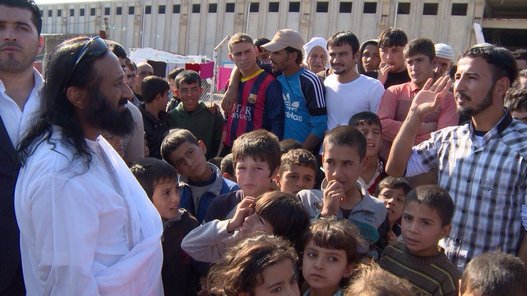Sri Sri Ravi Shankar’s Art of Living foundation claimed on Saturday that the spiritual guru had received death threats from the Islamic State terror group during his visit to Malaysia. Three letters with threats were received by the manager of the hotel where Ravi Shankar is staying at Penang in Malaysia, said Shikha Grover, a spokesperson for the foundation.
All three letters had a photo of an unidentified, blindfolded man purportedly being beheaded by a man whose face could not be seen. The letters had the threats in both English and Arabic and bore the Arabic logo of the Islamic State.
The letter sent to the hotel’s manager warned that the hotel would be “destroyed”. It further said another warning sent two weeks ago had stated that the guru would be killed if he carried out “his Hindu activities in Malaysia”.
The letter alleged Ravi Shankar was converting Muslims in Iran and Iraq and his organisations – Art of Living and International Association for Human Values – were “meddling in the Islamic affairs in Iran and Iraq”.
“We don’t want Ravi Shankar to step into any Muslim country. We are watching him…,” the letter said.
The letters sent to the two Art of Living officials contained similar allegations and warned that all venues for Ravi Shankar’s activities would be destroyed.
Grover said the Indian high commission and local authorities and police in Malaysia were informed about the threats. She said a yoga programme conducted by Art of Living in Penang on Saturday morning was attended by more than 10,000 people. Ravi Shankar would also address a gathering at Batu Kawan Stadium in Penang, she added.
In November last year, Ravi Shankar had visited Iraq for the third time and had addressed a peace conference at Erbil in the violence-hit province of Kurdistan.
He also visited relief camps near Erbil housing displaced Christians, Kurds and Arabs. The International Association for Human Values has been engaged in relief activities in Iraq. Along with other NGOs, the organisation supplies food for the Yazidi refugees in the Sinjar mountains.
Hindustan Times
 latest updates
latest updates





























